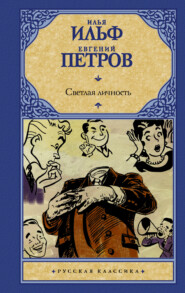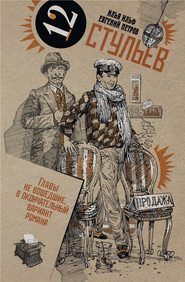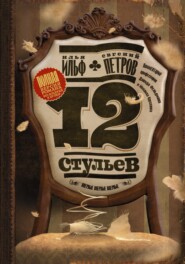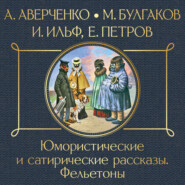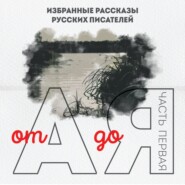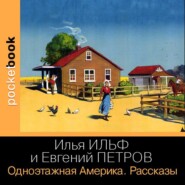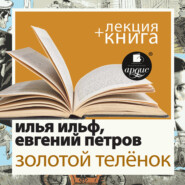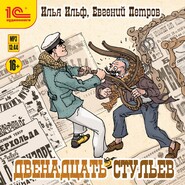По всем вопросам обращайтесь на: info@litportal.ru
(©) 2003-2025.
✖
The Twelve Chairs / Двенадцать стульев. Книга для чтения на английском языке
Автор
Жанр
Год написания книги
1928
Теги
Настройки чтения
Размер шрифта
Высота строк
Поля
He was not only the assistant warden, but also the chief warden. The previous one had been dismissed for rudeness to the inmates, and had been appointed conductor of a symphony orchestra. Alchen was completely different from his ill-bred boss. Under the system of fuller workdays, he took upon himself the running of the home, treating the pensioners with marked courtesy, and introducing important reforms and innovations.
Ostap Bender pulled the heavy oak door of the Vorobyaninov home and found himself in the hall. There was a smell of burnt porridge. From the upstairs rooms came the confused sound of voices, like a distant «hooray» from a line of troops. There was no one about and no one appeared. An oak staircase with two flights of once-lacquered stairs led upward. Only the rings were now left; there was no sign of the stair rods that had once held the carpet in place.
«The Comanche chief lived in vulgar luxury», thought Ostap as he went upstairs.
In the first room, which was spacious and light, fifteen or so old women in dresses made of the cheapest mouse-grey woollen cloth were sitting in a circle.
Craning their necks and keeping their eyes on a healthy-looking man in the middle, the old women were singing:
«We hear the sound of distant jingling,
The troika's on its round;
Far into the distant stretches
The sparkling snowy ground».
The choirmaster, wearing a shirt and trousers of the same mouse-grey material, was beating time with both hands and, turning from side to side, kept shouting:
«Descants, softer! Kokushkin, not so loud!»
He caught sight of Ostap, but unable to restrain the movement of his hands, merely glanced at the newcomer and continued conducting. The choir increased its volume with an effort, as though singing through a pillow.
«Ta-ta-ta, ta-ta-ta, ta-ta-ta,
Te-ro-rom, tu-ru-rum, tu-ru-rum …»
«Can you tell me where I can find the assistant warden?» asked Ostap, breaking into the first pause.
«What do you want, Comrade?»
Ostap shook the conductor's hand and inquired amiably: «National folk-songs? Very interesting! I'm the fire inspector».
The assistant warden looked ashamed.
«Yes, yes», he said, with embarrassment. «Very opportune. I was actually going to write you a report».
«There's nothing to worry about», said Ostap magnanimously. «I'll write the report myself. Let's take a look at the premises».
Alchen dismissed the choir with a wave of his hand, and the old women made off with little steps of delight.
«Come this way», invited the assistant warden.
Before going any further, Ostap scrutinized the furniture in the first room. It consisted of a table, two garden benches with iron legs (one of them had the name «Nicky» carved on the back), and a light-brown harmonium.
«Do they use primus stoves or anything of that kind in this room?»
«No, no. This is where our recreational activities are held. We have a choir, and drama, painting, drawing, and music circles».
When he reached the word «music» Alexander Yakovlevich blushed. First his chin turned red, then his forehead and cheeks. Alchen felt very ashamed. He had sold all the instruments belonging to the wind section a long time before. The feeble lungs of the old women had never produced anything more than a puppy-like squeak from them, anyway. It was ridiculous to see such a mass of metal in so helpless a condition. Alchen had not been able to resist selling the wind section, and now he felt very guilty.
A slogan written in large letters on a piece of the same mouse-grey woollen cloth spanned the wall between the windows. It said:
A BRASS BAND IS THE PATH TO COLLECTIVE CREATIVITY
«Very good», said Ostap. «This recreation room does not constitute a fire hazard. Let's go on».
Passing through the front rooms of Vorobyaninov's house, Ostap could see no sign of a walnut chair with curved legs and English chintz upholstery. The iron-smooth walls were plastered with directives issued to the Second Home. Ostap read them and, from time to time, asked enthusiastically:
«Are the chimneys swept regularly? Are the stoves working properly?»
And, receiving exhaustive answers, moved on.
The fire inspector made a diligent search for at least one corner of the house which might constitute a fire hazard, but in that respect everything seemed to be in order. His second quest, however, was less successful. Ostap went into the dormitories. As he appeared, the old women stood up and bowed low. The rooms contained beds covered with blankets, as hairy as a dog's coat, with the word «Feet» woven at one end. Below the beds were trunks, which at the initiative of Alexander Yakovlevich, who liked to do things in a military fashion, projected exactly one-third of their length.
Everything in the Home was marked by its extreme modesty; the furniture that consisted solely of garden benches taken from Alexander Boulevard (now renamed in honour of the Proletarian Voluntary Saturdays), the paraffin lamps bought at the local market, and the very blankets with that frightening word, «Feet». One feature of the house, however, had been made to last and was developed on a grand scale-to wit, the door springs.
Door springs were Alexander Yakovlevich's passion. Sparing no effort, he fitted all the doors in the house with springs of different types and systems. There were very simple ones in the form of an iron rod; compressed-air ones with cylindrical brass pistons; there were ones with pulleys that raised and lowered heavy bags of shot. There were springs which were so complex in design that the local mechanic could only shake his head in wonder. And all the cylinders, springs and counterweights were very powerful, slamming doors shut with the swiftness of a mousetrap. Whenever the mechanisms operated, the whole house shook. With pitiful squeals, the old women tried to escape the onslaught of the doors, but not always with success. The doors gave the fugitives a thump in the back, and at the same time, a counterweight shot past their ears with a dull rasping sound.
As Bender and the assistant warden walked around the house, the doors fired a noisy salute.
But the feudal magnificence had nothing to hide: the chair was not there. As the search progressed, the fire inspector found himself in the kitchen. Porridge was cooking in a large copper pot and gave off the smell that the smooth operator had noticed in the hall. Ostap wrinkled his nose and said: «What is it cooking in? Lubricating oil?» «It's pure butter, I swear it», said Alchen, blushing to the roots of his hair. «We buy it from a farm». He felt very ashamed.
«Anyway, it's not a fire risk», observed Ostap. The chair was not in the kitchen, either. There was only a stool, occupied by the cook, wearing a cap and apron of mouse-grey woollen material.
«Why is everybody's clothing grey? That cloth isn't even fit to wipe the windows with!» The shy Alchen was even more embarrassed. «We don't receive enough funds». He was disgusted with himself.
Ostap looked at him disbelievingly and said: «That is no concern of the fire brigade, which I am at present representing». Alchen was alarmed.
«We've taken all the necessary fire precautions», he declared. «We even have a fire extinguisher. An Eclair».
The fire inspector reluctantly proceeded in the direction of the fire extinguisher, peeping into the lumber rooms as he went. The red-iron nose of the extinguisher caused the inspector particular annoyance, despite the fact that it was the only object in the house which had any connection with fire precautions. «Where did you get it? At the market?» And without waiting for an answer from the thunderstruck Alexander Yakovlevich, he removed the Eclair from the rusty nail on which it was hanging, broke the capsule without warning, and quickly pointed the nose in the air. But instead of the expected stream of foam, all that came out was a high-pitched hissing which sounded like the ancient hymn «How Glorious Is Our Lord on Zion».
«You obviously did get it at the market», said Ostap, his earlier opinion confirmed. And he put back the fire extinguisher, which was still hissing, in its place.
They moved on, accompanied by the hissing.
Where can it be? wondered Ostap. I don't like the look of things. And he made up his mind not to leave the place until he had found out the truth.
While the fire inspector and the assistant warden were crawling about the attics, considering fire precautions in detail and examining the chimneys, the Second Home of the Stargorod Social Security Administration carried on its daily routine.
Dinner was ready. The smell of burnt porridge had appreciably increased, and it overpowered all the sourish smells inhabiting the house. There was a rustling in the corridors. Holding iron bowls full of porridge in front of them with both hands, the old women cautiously emerged from the kitchen and sat down at a large table, trying not to look at the refectory slogans, composed by Alexander Yakolevich and painted by his wife. The slogans read:
FOOD IS THE SOURCE OF HEALTH
ONE EGG CONTAINS AS MUCH FAT AS A HALF-POUND OF MEAT
BY CAREFULLY MASTICATING YOUR FOOD YOU HELP SOCIETY
MEAT IS BAD FOR YOU
These sacred words aroused in the old ladies memories of teeth that had disappeared before the revolution, eggs that had been lost at approximately the same time, meat that was inferior to eggs in fat, and perhaps even the society that they were prevented from helping by careful mastication.






